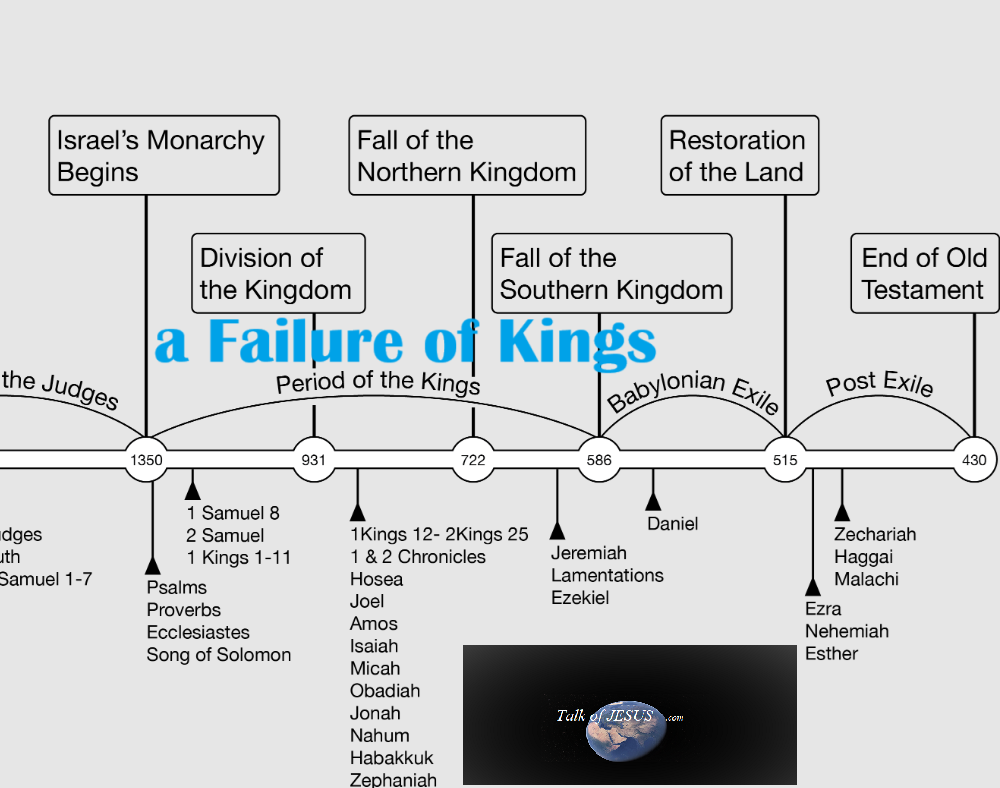What do you think about Kings?
- Do you have a Sovereign?
- Would you like to follow one?
Who is your King?
Perhaps your gut response would be no different than that of the high priests of Jerusalem at the capital trial of Jesus.
The chief priests answered, We have no king but Caesar.
Gospel of John 19:15b King James Version
You may say that WE have no religious leaders in charge of a nation. But look closer at leadership titles where you will discover priests in politics. And don’t miss some presidents, premiers, prime ministers and even kings governing as Caesars.
Descendants of Abraham did not always have kings, nor did the kings of Israel, Judah and Judea always have power.
a reminder of Roger@TalkofJesus.com
a glance at kings of the Promised Land
Previously we witnessed pre-history as a timeline, essentially beginning again from the restoration of life at the time of NOAH.
Which kings in history have been successful and which kings were a failure?
TODAY, before we proceed to the recognized historical kings of Israel let’s also consider others from the Mosaic record.
kings and princes mentioned by Moses
mālaḵ verb, מָלַךְ
Strong’s H4427 in the following manner: reign (289x), king (46x), made (4x), queen (2x).. more
And Bela the son of Beor reigned H4427 in Edom: and the name of his city was Dinhabah.
- KINGS of cities (or later City-States in places such as Greece)
- Perhaps Prince would fit better.
- Or maybe, Mayor? (But they were military generals as well.)
meleḵ מֶלֶךְ
The KJV translates Strong’s H4428 in the following manner: king (2,518x), misc..
That these made war with Bera king H4428 of Sodom, and with Birsha king H4428 of Gomorrah, Shinab king H4428 of Admah, and Shemeber king H4428 of Zeboiim, and the king H4428 of Bela, which is Zoar.
Genesis 14:2 King James Version
These are just a few of the kings who made war. (That’s what Kings tend to do.) Therefore, Abraham (a Prince without a city. So like these kings and generals he was treated as a king when he helped them win a battle.
And Melchizedek king H4428 of Salem brought forth bread and wine: and he was the priest of the most high God.
14:18 וּמַלְכִּי־צֶדֶק מֶלֶךְ שָׁלֵם הוֹצִיא לֶחֶם וָיָיִן וְהוּא כֹהֵן לְאֵל עֶלְיוֹן׃
Melchizedek NOT just the mayor of Jerusalem or a mere Prime Minister or even Prince (as Abraham was generally treated) — the כֹּהֵן – kōhēn – Priest of ʿelyôn ‘ēl –
THE MOST HIGH GOD לְאֵל עֶלְיוֹן׃
IF in this 21st century of the Common Era WE independent evangelists (who know nothing of kings) attempt to compare Abraham, Melchizedek, David or Solomon to any common Caesar of this day,
or
IF WE anoint JESUS with simply the same royal title of any King (such as Charles),THEN WE miss many overlapping roles of Sovereignty the Lord God gave to these men
AS WELL AS equally important roles of the Christ our High Priest and our Prophet dismissed and diminished by the common Caesar’s of these last days.
Kings of the Promised People
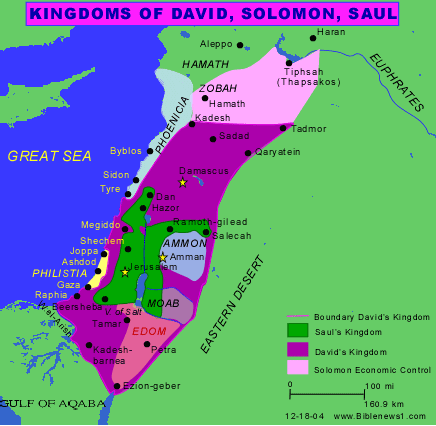
From a promise of the LORD to Abraham, a king without a country,
to David conquering King uniting twelve tribes, Solomon son of David built the Temple and an Empire.
You will be as familiar with the Dan to Beersheba borders as me.
Additionally you may have discerned that Solomon conquered to the north beyond Damascus as far as Tiphsah on the Euphrates River [1 Kings 4:24].
Solomon a distant memory of success
The Jews of Jesus’ incarnate days had visualized their glorious past in the empire of Solomon. These contemporaries of Jesus nostalgically recalled Solomon as a Caesar of Israel in his time.
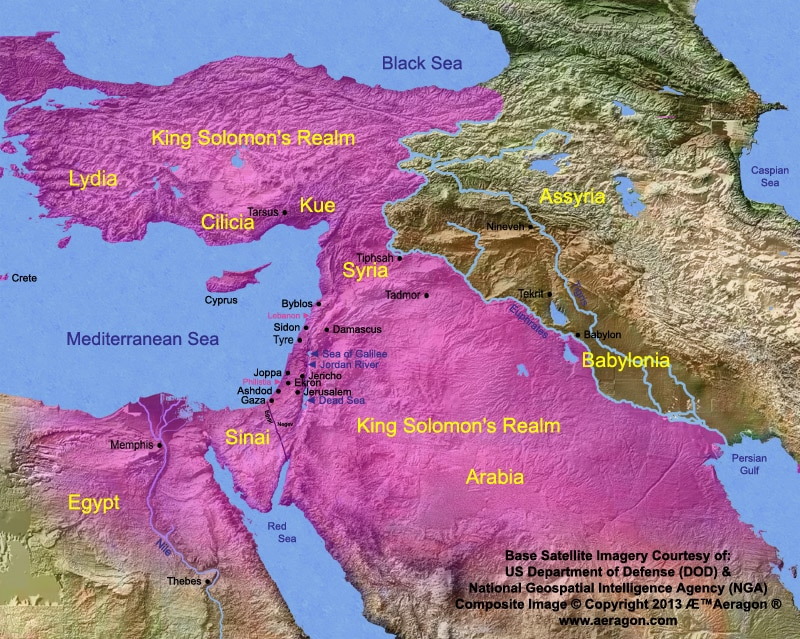
From ~989 B.C. until his death in ~931 B.C. Solomon’s influence extended even into all the nearby world.
Centuries of Failed Kings Before Christ
We still have not reached the center of all history and the Advent of the Messiah of Israel now to be predicted by the Prophets.
Keep in mind that now Israel and Judah will have separate kings eventually overruled by conquering kings.
King Solomon, however, loved many foreign women along with the daughter of Pharaoh [king of Egypt]—women of Moab, Ammon, Edom, and Sidon, as well as Hittite women.
2 These women were from the nations about which the LORD had told the Israelites, “You must not intermarry with them, for surely they will turn your hearts after their gods.”
1 Kings 11:1-2 BSB
Christian preaching makes much of monogamy here while ignoring common customs of marriage alliances between political rulers of nations through intermarriage. Yet the LORD had forbidden it.
And incentives inviting our cultural bias against the True God of Israel continue as a leaven diluting a Common Era Church to this day.
Frequently forced alliances led to the fall of Israel [722 BC] and decline through gradual apostasy compromised Judah just a century later [606 BC].
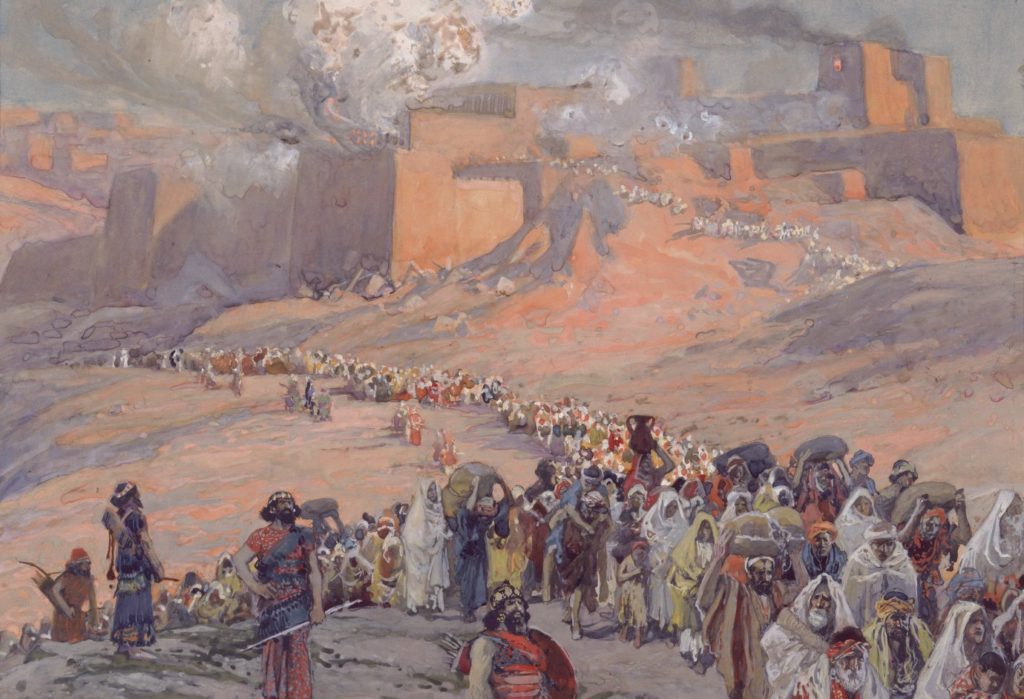
606 B.C. Some captives taken to Babylon. (Daniel included)
597 B.C. More captives taken to Babylon. (Ezekiel included)
586 B.C. Jerusalem is destroyed by fire.
Kings of Chosen Captives
Without dwelling on all the kings of both Israel and Judah who ‘did evil in the sight of the LORD,’ we’ll move forward to those left powerless by defeat and the refining of the Lord our God.
2 Kings 17 – Failure of Israel
3 Against him came up Shalmaneser king of Assyria.
And Hoshea became his vassal and paid him tribute. But the king of Assyria found treachery in Hoshea, for he had sent messengers to So, king of Egypt, and offered no tribute to the king of Assyria, as he had done year by year.
Therefore the king of Assyria shut him up and bound him in prison.
Egypt's king (not so much a god and Pharoah to an Assyrian king) wouldn't help Hoshea out of his political servitude to Shalmaneser king of Assyria.
Does this king's representative vassal relationship sound somewhat prophetic of a later Herodian whoredom with Rome?
Then the king of Assyria invaded all the land and came to Samaria, and for three years he besieged it.
In the ninth year of Hoshea, the king of Assyria captured Samaria, and he carried the Israelites away to Assyria…
2 Kings 17:5-6a ESV ~724BC -722 BC
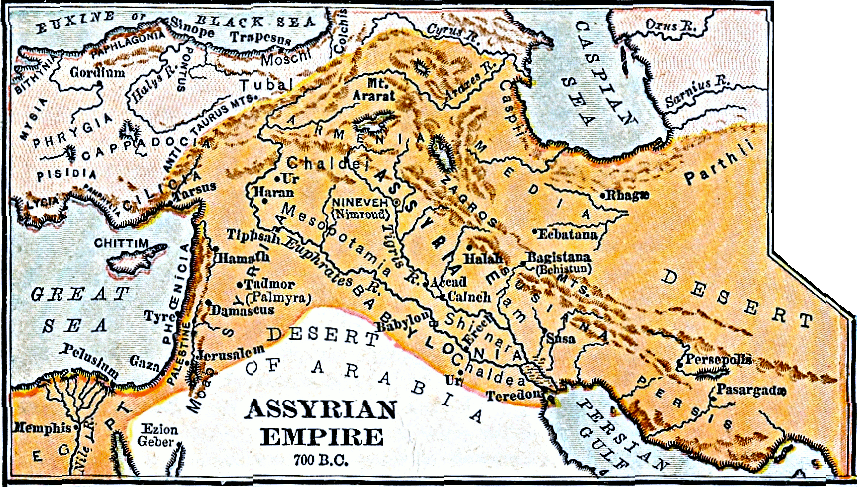
Meanwhile, back in Judah
Hezekiah trusted in the LORD, the God of Israel. No king of Judah was like him, either before him or after him. He remained faithful to the LORD and did not turn from following Him; he kept the commandments that the LORD had given Moses.
7And the LORD was with Hezekiah, and he prospered wherever he went. He rebelled against the king of Assyria and refused to serve him. 8He defeated the Philistines as far as Gaza and its borders, from watchtower to fortified city.
- 701 B.C. 200,000 of the inhabitants of Judah captured by Sennacherib
- 621 B.C. Nineveh, Assyria falls to Babylon and Media (the Medes)
- 586 B.C Judah falls to Babylon, the rebuilt Temple destroyed and captured families of the leading Jews led captive to Babylonia

600 years Before Christ, No more Kings of Israel;
No King of the Jews in Jerusalem!
Hope only for a few
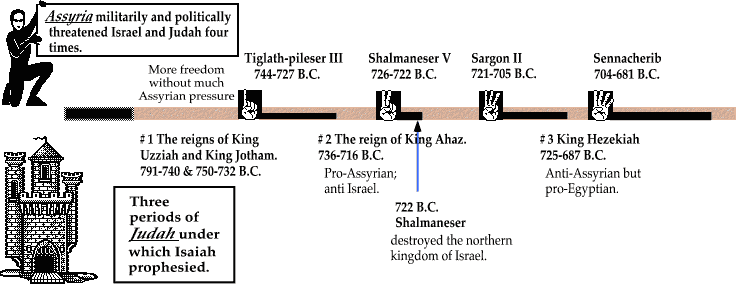
Biblical Foundations of Freedom
The Prophesy of Isaiah, with some familiar to Christians as prophesy foreseeing the Messiah born in Bethlehem of Judea (formerly Judah), is set earlier than what we have just read in the context of the divided kingdom.
Isaiah 10:
Here in part is Isaiah’s and the LORD’s lament:
11 ” ‘..shall I not deal with Jerusalem and her images
as I dealt with Samaria and her idols?’ ”
19 And the remaining trees of his forests will be so few
that a child could write them down.
22 For though your people Israel be as the sand of the sea, only a remnant of them will return. Destruction is decreed, overflowing with righteousness.
Two mote Empires (Before Christ & Rome)
For those who like me may have occasionally fallen asleep in history class I'll make this rise and fall of three Empires brief.
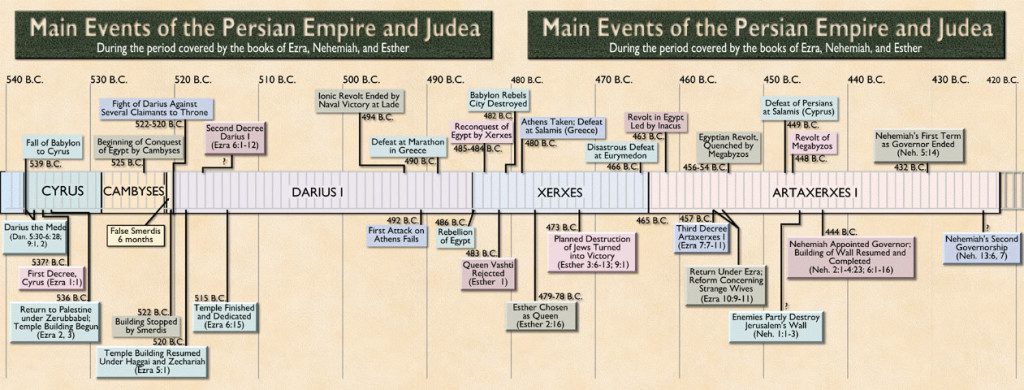
- a remnant does return to Jerusalem and rebuilds its wall and Temple
- 536 B.C. Cyrus the Great permitted the return. 49,897 Jews returned from Babylon to Jerusalem.
- 516 B.C. The temple was completed. source
- (Jerusalem will later get a Governor, Nehemiah and a Priest, Ezra),
- But still no King since they are subjects of Persia.
If not a king, how about a Queen?
And the king loved Esther above all the women, and she obtained grace and favour in his sight more than all the virgins; so that he set the royal crown upon her head, and made her queen instead of Vashti.
Esther 2:17 KJV
Yet Esther becomes co-regent of the Medes and Persians [~478 B.E.] not simply a small remote city of Jerusalem.
- Malachi’s prophecy likely came sometime after the ministry of Nehemiah around BC 458-445.
- Malachi is the last prophet to speak before Christ.
Before Caesars, Greeks
The advent of Christ takes place in Judea and beyond, documented in Greek texts as was the whole New Testament. Persia.
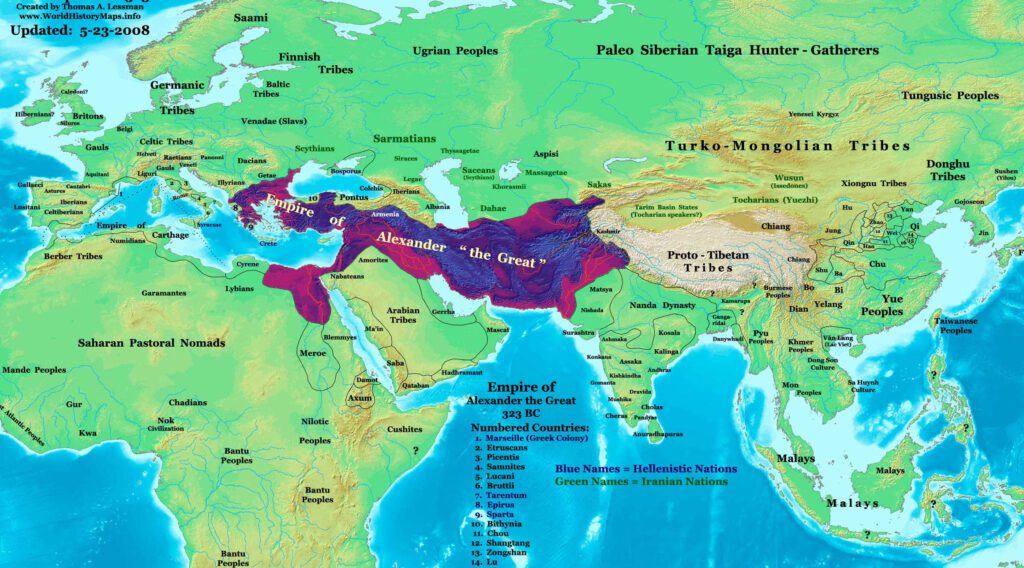
It’s a period of some 400 years Before Christ.
Jews from Persia in the east, in Samaria to the north and even west as far as Rome became divided in their interest in the Bible given by Moses and the Prophets.
Thanks to Alexander the Great, the nearby world of the Herod’s and Jews spoke Greek (not Hebrew or certainly not the Latin of Rome).
In the timeline of all history Rome’s consequent defeat of other kings, princes and generals after Alexander’s death and division of yet another Empire would set the stage for the birth of a King from before all time born into it in a little Judean town unnoticed by a vassal King appointed by Caesar, a king of a captive Israel actually raised in distant Rome.
These centuries of ADVENT lead up to a glorious day central to all of history and all of mankind.
NEXT: Christmas 2024 of the Common Era, God-willing
